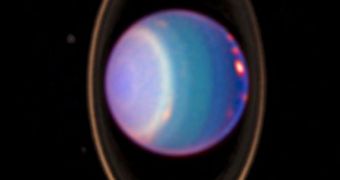Recent studies trying to establish what exactly tilted Uranus's orbit to a 98-degree angle have reawaken a great deal of interest in the ice giant. Now, experts are proposing a new mission to the celestial body, in hopes of unlocking more of its many mysteries
The idea is not new. Many such missions were proposed over the years, but recently even the Decadal Survey released by the Planetary Society advocated for the need of brining Uranus in the spotlight.
NASA and other space agency already have space probes or orbiters investigating Saturn, Jupiter, Mars, Venus and Mercury, in addition to the dwarf planets Ceres and Pluto, and the massive asteroid Vesta. From this point of view, Uranus or Neptune would seem like the next logical step.
What is so interesting about the two outermost planets in the solar system is the fact that they are not gas giants like Jupiter and Saturn. In other words, they are not made up of hydrogen and helium gas, but rather out of water-ice, carbon dioxide, ammonia and methane.
Furthermore, the most recent investigations have demonstrated that the number of ice giant exoplanets exceeds that of gas giant ones by a wide margin. As such, studying Neptune and Uranus could provide us with a deeper understanding of more stars systems, experts say.
“Uranus is a type of a planet that we know very little about. Thirty years ago, we thought Uranus and Neptune were just smaller versions of Jupiter and Saturn. We'd like to study our local examples of this common type of planet,” NASA Jet Propulsion Laboratory (JPL) expert Mark Hofstadter explains.
When it comes to separating between the two ice giants, it's important to note some of the distinctions between them. Generally speaking, Uranus is weirder than its counterpart, mostly due to its high orbital inclination and its unique type of rotation. Its internal structure has also proven hard to decipher.
“Both the European and American sides are convinced that an orbiter is needed rather than a flyby. But then costs rear their ugly head,” University College London (UCL) Uranus Pathfinder principal investigator Chris Arridge explains.
This project was recently considered by the European Space Agency, but officials could not decide on whether to pursue it or not. “The project is by no means dead. Interest is building to go back to Uranus,” the expert says, quoted by Space.

 14 DAY TRIAL //
14 DAY TRIAL //